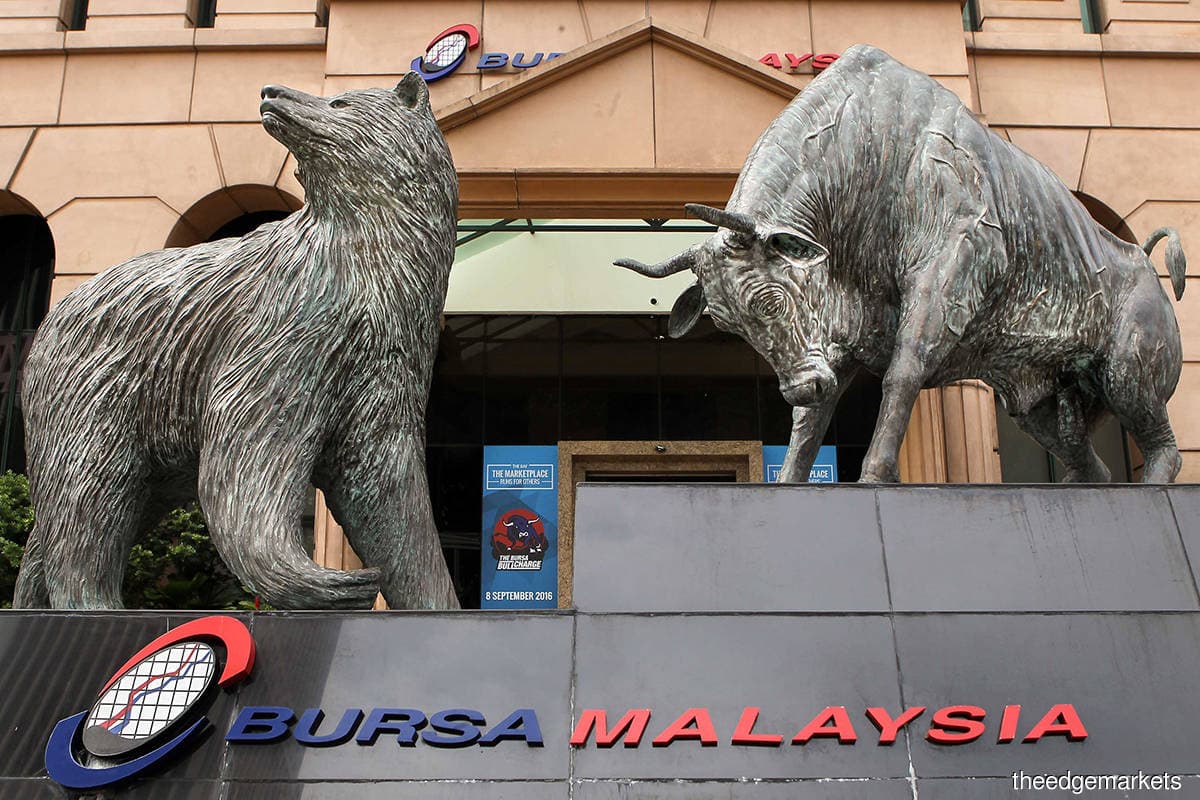
KUALA LUMPUR (July 29): While Bursa Malaysia has reported strong results for the quarter ended on June 30, 2020 (2QFY20), analysts however expect daily average trading value (DATV) to taper off from 4Q with the loan moratorium likely to end on Sept 30.
AmInvestment Bank Bhd analyst Kelvin Ong said borrowers will then be required to start servicing their loan repayments from Oct 1, 2020 and this is expected to reduce the level of cash to be diversified into stocks in search for higher yields as seen recently.
“Also, the suspension of short selling and flexibility of share margin accounts are seen only as temporary measures to encourage retail participation in the securities market. Our valuation is already based on FY21F earnings, and we do not expect these measures to continue moving into 2021.
Ong said Bursa reported strong 2QFY20 earnings of RM86 million (up 33.2% quarter-on-quarter) on the back of higher securities trading revenue with a strong DATV of RM3.8 billion versus RM2.5 billion in the preceding quarter.
"It was slightly lower than our expected profit of RM90 million to RM91 milion for the quarter due to higher staff cost.
“We downgrade our call for Bursa to ‘hold’ from ‘buy’ with a revised fair value (FV) of RM9.30 (previously RM8.20) due to high valuation of the stock which is already trading at a price-earnings ratio (PER) of over 30 times.
“We tweak our FY20F/21F earnings by +4.1%/-2.6% after adjusting our DATV and effective clearing fee rate assumptions for the securities market. We now expect DATV of RM3 billion/RM2.5 billion for the securities market in FY20/21 respectively (previously RM2.8 billion/RM2.5 bilion).
“We are now pegging the stock at a PER of 28 times (previously 24 times) based on the average of the listed stock exchanges regionally,” Ong wrote in a note today.
Meanwhile, Hong Leong Investment Bank (HLIB) Research analyst Jeremy Goh raised his PER target from 30 times to 35 times, leading to a rise in the target price (TP) to RM11.85 from RM9.84 — pegged at FY20F earnings per share (EPS).
He maintained his "buy" call for Bursa.
“While we had expected some downward normalisation of retail trading post the movement control order (MCO) period, this doesn’t seem to be the case as average retail participation in June-July of 37.8% was higher than during the MCO period (March 18 to end-April: 32.5%) and retailers bought RM2.96 billion net in June-July, exceeding March-April's RM2.7 billion.
“Still, we are mindful that this may taper off in 4Q once the loan moratorium ends (reducing 'retail liquidity'), although the magnitude is anyone’s guess. On the flip side, sustained robust ADV (average daily trading value) into 4Q would be a clear catalyst. In any case, 2020 ADV (RM3.41 billion year-to-date) is likely to trump the highs of 2017 (RM2.31 billion) and 2018 (RM2.39 billion),” he wrote in a note.
Goh fine-tuned his 2020 ADV forecast to RM2.99 billion (4% higher), partially offset by higher staff bonuses. Overall, he raised his FY20 earnings forecast by 3.2% (FY21F-22F relatively unchanged).
Meanwhile, Kenanga Research analyst Ahmad Ramzani Ramli raised his FY21 PER valuation to 31.3 times (from 25 times), implying 2SD (standard deviation) above Bursa’s five-year mean, given that the exceptionally strong performance in 2QFY20 is likely to persist into 3QFY20.
“Our TP is raised to RM9.40 (from RM7.25). We downgrade our call to 'MP' (market perform), given that the strong securities trading is likely to taper off in 4Q,” he said.
“We anticipate high levels of volatility to persist as investors seek comfort in counters which are the least scathed by the Covid-19 pandemic and falling commodity prices.
“We expect retailers to take on bets on the heightened activity, with rebounds from low bases appearing to be a favourite theme, but we do not bet on the heightened participation (at 33%, its best performance in 10 years), which we believe alluded to retailers looking for better returns given the slew of OPR (overnight policy rate) cuts recently and that it was possibly funded by additional cash available as a result of the loan moratorium.
“While we expect volatility to continue to persist, we expect it to taper off in 4Q given soft economic data,” said Ahmad Ramzani.
Kenanga raised its FY20F/FY21F earnings by 17%/4% respectively on more bullish assumptions for securities trading in 3Q.
“Keeping with the previously targeted payout ratio [of about 91%], we raise our dividend payment for FY20F to 32 sen (from 28 sen previously),” he added.
At the time of writing, shares in Bursa were seven sen or 0.7% lower at RM9.97, valuing the group at RM8.06 billion.